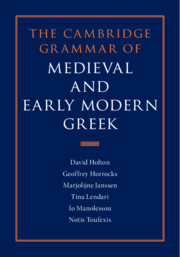56 results
3 - Adjectives
- from Part II - Nominal Morphology
-
- Book:
- The Cambridge Grammar of Medieval and Early Modern Greek
- Published online:
- 06 November 2020
- Print publication:
- 18 April 2019, pp 688-829
-
- Chapter
- Export citation
Abbreviations
-
- Book:
- The Cambridge Grammar of Medieval and Early Modern Greek
- Published online:
- 06 November 2020
- Print publication:
- 18 April 2019, pp clxi-clxii
-
- Chapter
- Export citation
3 - Augment
- from Part III - Verb Morphology
-
- Book:
- The Cambridge Grammar of Medieval and Early Modern Greek
- Published online:
- 06 November 2020
- Print publication:
- 18 April 2019, pp 1394-1433
-
- Chapter
- Export citation
5 - Nouns and Noun Phrases
- from Part IV - Syntax
-
- Book:
- The Cambridge Grammar of Medieval and Early Modern Greek
- Published online:
- 06 November 2020
- Print publication:
- 18 April 2019, pp 1944-1992
-
- Chapter
- Export citation
1 - Introduction
- from Part III - Verb Morphology
-
- Book:
- The Cambridge Grammar of Medieval and Early Modern Greek
- Published online:
- 06 November 2020
- Print publication:
- 18 April 2019, pp 1267-1272
-
- Chapter
- Export citation
5 - Morphosyntax
- from Part III - Verb Morphology
-
- Book:
- The Cambridge Grammar of Medieval and Early Modern Greek
- Published online:
- 06 November 2020
- Print publication:
- 18 April 2019, pp 1767-1858
-
- Chapter
- Export citation
4 - Stress
- from Part I - Phonology
-
- Book:
- The Cambridge Grammar of Medieval and Early Modern Greek
- Published online:
- 06 November 2020
- Print publication:
- 18 April 2019, pp 222-238
-
- Chapter
- Export citation
3 - Consonants
- from Part I - Phonology
-
- Book:
- The Cambridge Grammar of Medieval and Early Modern Greek
- Published online:
- 06 November 2020
- Print publication:
- 18 April 2019, pp 112-221
-
- Chapter
- Export citation
Part I - Phonology
-
- Book:
- The Cambridge Grammar of Medieval and Early Modern Greek
- Published online:
- 06 November 2020
- Print publication:
- 18 April 2019, pp 1-2
-
- Chapter
- Export citation
4 - Adverbs
- from Part II - Nominal Morphology
-
- Book:
- The Cambridge Grammar of Medieval and Early Modern Greek
- Published online:
- 06 November 2020
- Print publication:
- 18 April 2019, pp 830-844
-
- Chapter
- Export citation
7 - Coordination and Apposition
- from Part IV - Syntax
-
- Book:
- The Cambridge Grammar of Medieval and Early Modern Greek
- Published online:
- 06 November 2020
- Print publication:
- 18 April 2019, pp 2008-2021
-
- Chapter
- Export citation
Index of Innovative Greek Endings and Suffixes
-
- Book:
- The Cambridge Grammar of Medieval and Early Modern Greek
- Published online:
- 06 November 2020
- Print publication:
- 18 April 2019, pp 2085-2094
-
- Chapter
- Export citation
2 - Stem Formation
- from Part III - Verb Morphology
-
- Book:
- The Cambridge Grammar of Medieval and Early Modern Greek
- Published online:
- 06 November 2020
- Print publication:
- 18 April 2019, pp 1273-1393
-
- Chapter
- Export citation

The Cambridge Grammar of Medieval and Early Modern Greek
-
- Published online:
- 06 November 2020
- Print publication:
- 18 April 2019
Contents
-
- Book:
- The Cambridge Grammar of Medieval and Early Modern Greek
- Published online:
- 06 November 2020
- Print publication:
- 18 April 2019, pp v-vi
-
- Chapter
- Export citation
Introduction
- from Part IV - Syntax
-
- Book:
- The Cambridge Grammar of Medieval and Early Modern Greek
- Published online:
- 06 November 2020
- Print publication:
- 18 April 2019, pp 1861-1862
-
- Chapter
- Export citation
Index of Linguistic Terms and Concepts
-
- Book:
- The Cambridge Grammar of Medieval and Early Modern Greek
- Published online:
- 06 November 2020
- Print publication:
- 18 April 2019, pp 2041-2058
-
- Chapter
- Export citation
Acknowledgements
-
- Book:
- The Cambridge Grammar of Medieval and Early Modern Greek
- Published online:
- 06 November 2020
- Print publication:
- 18 April 2019, pp xxvii-xxviii
-
- Chapter
- Export citation
Part IV - Syntax
-
- Book:
- The Cambridge Grammar of Medieval and Early Modern Greek
- Published online:
- 06 November 2020
- Print publication:
- 18 April 2019, pp 1859-1860
-
- Chapter
- Export citation
Part II - Nominal Morphology
-
- Book:
- The Cambridge Grammar of Medieval and Early Modern Greek
- Published online:
- 06 November 2020
- Print publication:
- 18 April 2019, pp 239-240
-
- Chapter
- Export citation



